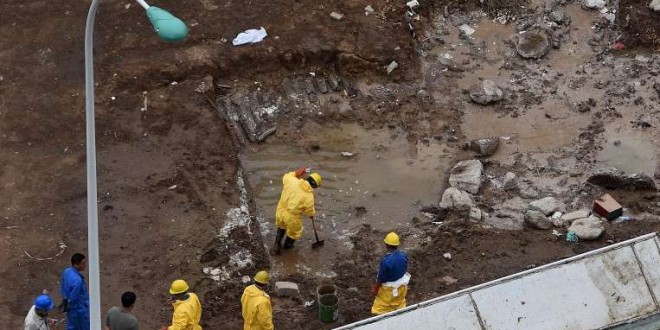TIANJIN, China: Tianjin has strengthened its efforts to prevent the dispersal of hundreds of tonnes of toxic cyanide from the site of the warehouse explosions amid rainfall forecast.
Tests of wastewater in Tianjin, the port city where more than 100 people were killed in the blasts late on Aug. 12 and an apocalyptic fire that followed, showed that cyanide levels were 356 times the national standard in areas near the blast site, officials said. Cyanide is a potentially deadly chemical that is widely used in manufacturing but can be toxic even in small quantities.
At a news conference Thursday, Tian Weiyong, director of the emergency department of the Ministry of Environmental Protection, said the government would work to treat the water, which was mostly runoff from water used to fight the large fire, before it is released into local sewers.
The immediate surroundings of the blast site have been closed off, and Tian noted that tests of water outside that area showed that cyanide levels were normal.
The environmental consequences of the blasts, which killed 114 people and injured at least 790, are only beginning to become apparent. The Chinese state news media on Thursday published photos of scores of dead fish that had washed up on the shores of Bohai Sea, which borders Tianjin. Officials said that they were investigating the situation but that there could be a variety of causes, not just the recent explosions.
Wu Yixiu, an activist with Greenpeace in China, said there was most likely an array of toxic chemicals in the water that had yet to be detected.
“There is simply not enough time to conduct a chemical screen to understand the scale of the pollutants, thus not enough understanding on the potential risks,” Wu wrote in an e-mail.
Chinese officials are contending with a public that is increasingly losing its patience. In recent days, residents have staged protests demanding compensation for damaged homes. The explosions began inside a warehouse that was storing at least 2,500 tons of hazardous chemicals, including sodium cyanide, ammonium nitrate, and potassium nitrate.
At a Politburo meeting Thursday, President Xi Jinping promised a full investigation into the explosions.
“The incident has caused heavy casualties and property loss,” said a statement by the Politburo released after the meeting. “It was a profound lesson paid with blood.”
Agencies/Canadajournal
 Canada Journal – News of the World Articles and videos to bring you the biggest Canadian news stories from across the country every day
Canada Journal – News of the World Articles and videos to bring you the biggest Canadian news stories from across the country every day



